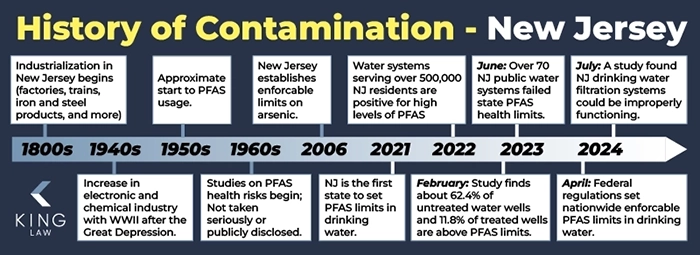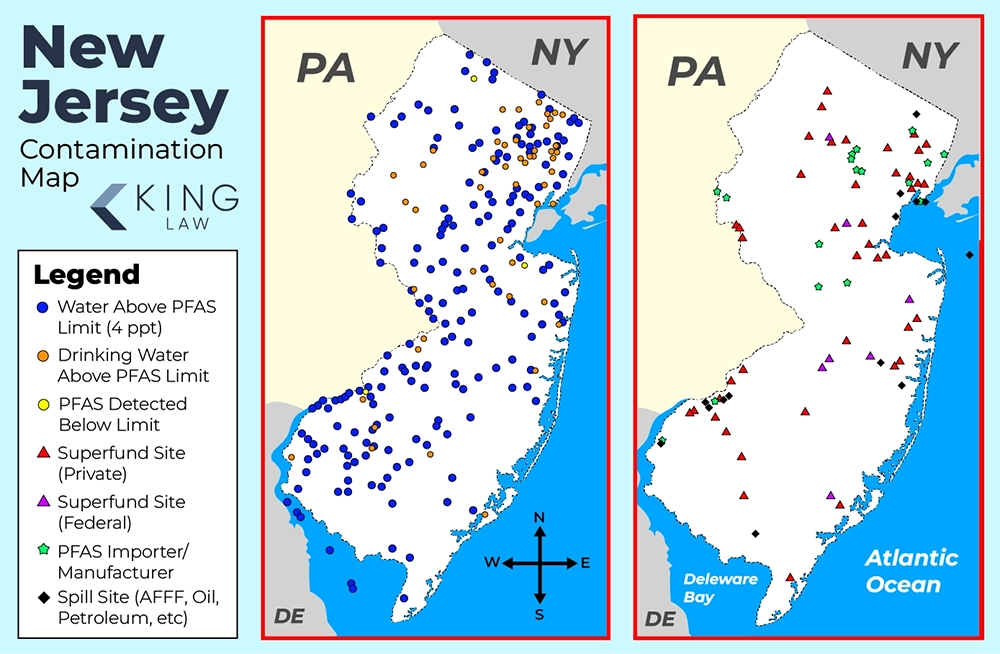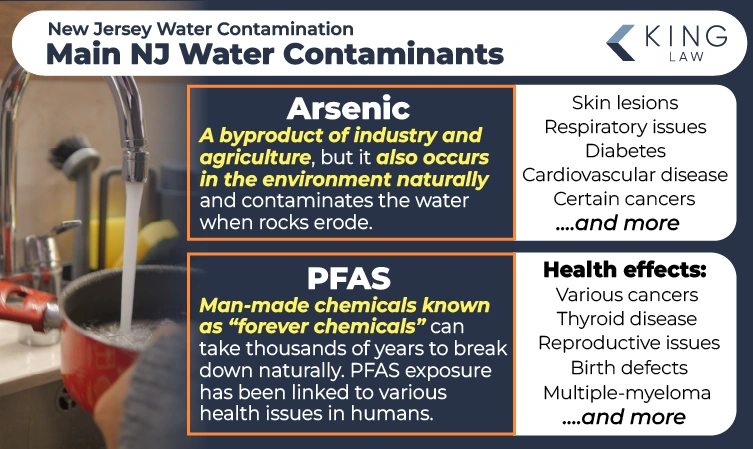
New Jersey continues to battle with contaminated drinking water, especially when it comes to “forever chemicals.” Forever chemicals refer to a group of substances, PFAS, that are found in many products, including firefighting foam (AFFF). States with military bases that frequently used firefighting foam are now grappling with spreading contamination putting the public at risk of a myriad of diseases, including many different types of cancer.
More and more New Jersey residents and workers are filing water contamination claims after being diagnosed with a serious condition related to toxic water. King Law is dedicated to representing these victims, so if you’ve been impacted, contact us as soon as possible to set up an initial consultation to get the justice you deserve.
New Jersey Water Contamination Lawsuit Overview
New Jersey has a rich colonial history stemming back to 1609, and it also played a prominent role in the Revolutionary War. However, its contamination issues really emerged in the 1800s during a time of industrialization. Factories popped up in major cities to produce trains, iron and steel products, and more. The population went on to grow and double between 1900 and 1930 alongside a booming $4 billion manufacturing industry. This then segued into the Great Depression and World War II with an increase in electronic and chemical industry operations.
Unfortunately, industrial activities released multiple different contaminants into the environment, including arsenic and PFAS. A major concern is contaminated groundwater, which negatively impacts drinking water quality and public safety. Many victims are joining thousands of individuals across the country in filing lawsuits against chemical manufacturers after their wrongful exposure.
New Jersey Water Contamination Lawsuit Updates
New Jersey has put many different regulations in place to promote safe drinking water standards. In 2018, it was the first state to propose enforceable drinking water standards for PFAS. Otherwise, municipalities were not required to monitor and address PFAS levels, even if they were above health recommendations. Enforceable regulations were not instituted until April 2024, so individuals have been potentially consuming unsafe levels of PFAS for decades.
The number of water contamination lawsuits being filed in the United States has grown recently as more and more victims are facing diagnosis of Kidney Cancer, Testicular Cancer, Liver Cancer, Thyroid Cancer, Thyroid Disease, Ulcerative Colitis, and other life-threatening illnesses. If you know you’ve been exposed to toxic water and have developed a serious illness, you could be entitled to compensation that can help with medical bills, lost wages, and other damages.
3M to Pay New Jersey $450 Million Settlement For PFAS Contamination Lawsuit
After pursuing legal action against 3M for polluting drinking water with PFAS, New Jersey has secured a settlement to help address water contamination. On May 13, 2025, New Jersey Attorney General Matthew J. Platkin and Department of Environmental Protection (DEP) Commissioner Shawn M. LaTourette announced that New Jersey has settled a lawsuit filed against the chemical manufacturer 3M in 2019.
The lawsuit alleged that PFAS chemicals from an industrial complex, called the Chambers Works facility, polluted the Delaware River and drinking water sources in the state with so-called forever chemicals. The complex, which is located in Deepwater, New Jersey, has been owned by DuPont and Chemours. Although 3M, DuPont, and Chemours were all named as defendants, only 3M has offered a settlement. This settlement, which is the largest settlement related to clean-water efforts in the state’s history, will be used to remove and control PFAS in water supplies.
About New Jersey Water Contamination:
The History of Water Contamination in New Jersey
New Jersey Water Contamination Map
Contaminants Found in New Jersey Drinking Water
Current Water Quality in New Jersey
Health Risks and Symptoms Linked to Drinking Water in New Jersey
Eligibility Criteria for the New Jersey Water Contamination Lawsuit
New Jersey Water Contamination Settlement and Payout Amounts
How to File a New Jersey Water Contamination Lawsuit
Statute of Limitations for New Jersey Water Contamination Claims
The History of Water Contamination in New Jersey
Despite New Jersey establishing official regulations around levels of arsenic and PFAS in drinking water, both contaminants continue to be a major concern for public safety. For many, negative health impacts are prompting them to seek legal action. Key sources of contamination in New Jersey have stemmed from industrial discharges, military activity, wastewater treatment plants, landfills, and natural geographical occurrences.
- August 2025: DuPont, Chemours, and Corteva have reached a historic settlement with the State of New Jersey. The three companies will pay $2 billion to address PFAS contamination throughout the state. The settlement breakdown is as follows: the polluters will have to pay $875 million in in damages to the state over a 25-year period; DuPont will have to create a $1.2 billion remediation fund for cleanup efforts at four of their sites; and a separate $475 million reserve fund will be created to cover costs in case any of the companies go out of business of file for bankruptcy. This settlement will close out lawsuits associated with the Chambers Works, Parlin, Pompton Lakes, and Repauno PFAS industrial sites. This agreement still needs to be approved by the courts.
- May 2025: New Jersey has reached a settlement with 3M over lawsuits filed due to PFAS contamination. 3M has agreed to pay the state $285 million to address PFAS contamination. The lawsuits were related to the Chambers Works site in Salem County, New Jersey. Although the plant is owned by Chemours and DuPont, 3M knowingly supplied PFAS to these manufacturers, despite the known dangers of these “forever chemicals.” New Jersey will use the funds to address contaminated land and water supplies.
- July 2024: A study by Rutgers found that New Jersey drinking water filtration systems could be malfunctioning and releasing arsenic into drinking water after 71% of tested homes had high concentrations of adsorbed arsenic.
- April 2024: Federal regulations put nationwide enforceable limits in place for PFAS in drinking water, prompting more action in affected New Jersey communities.
- June 2023: More than 70 New Jersey public water systems failed state PFAS health limits, which was expected to reach into the 100s once enforceable PFAS limits were established.
- February 2023: A study finds that around 62.4% of untreated wellwater samples and 11.8% of treated wellwater samples tested above New Jersey’s Maximum Contaminant Level (MCL) for arsenic.
- January 2022: Water systems serving more than 500,000 New Jersey residents tested positive for high levels of PFAS. This impacted 34 community water systems, especially those under Middlesex Water Company.
- 2021: New Jersey became the first state to set limits for PFAS in drinking water, even before the EPA established standards, due to ongoing concerns about contamination.
PFAS has been used since around the 1950s with initial studies about their risks emerging in the 1960s and 1970s. However, these risks weren’t publicly disclosed or taken seriously, leading to decades of continued use and exposure. Arsenic has also been a major concern for decades, prompting New Jersey to establish their own enforceable limits in 2006. Despite this action, residents continue to face unsafe levels of arsenic in their home’s water.

New Jersey Water Contamination Map

Reference our New Jersey water contamination map for a better idea of how widespread contamination is across the state. Color coding shows different levels of PFAS found in drinking water samples. Keep in mind that today’s enforceable limits are 4ppt for PFOA and 4ppt for PFOS. In many communities, levels far exceeded this limit.
Contaminants Found in New Jersey Drinking Water
Below are some of the most prominent contaminants found in New Jersey drinking water:
Per- and Polyfluoroalkyl Substances (PFAS)
Per- and polyfluoroalkyl substances (PFAS), often referred to as “forever chemicals,” are toxic compounds that persist in the environment and the human body without breaking down. A significant source of PFAS contamination in drinking water is military base activities. The military used firefighting foam containing PFAS during fire training exercises and to extinguish fires. This foam was either sprayed directly on the ground or potentially seeped into groundwater due to improper storage, spills, or disposal practices.
PFAS water contamination is a concern throughout the state of New Jersey. Unsafe levels of these chemicals is linked to:
- Birth defects
- Bladder cancer
- Breast cancer
- Changes in liver enzymes
- Decreased vaccine effectiveness
- Hodgkin’s and non-Hodgkin’s lymphoma
- Leukemia
- Lowered immune response
- Multiple-myeloma
- Kidney cancer
- Pancreatic cancer
- Prostate cancer
- Reproductive issues
- Testicular cancer
- Thyroid cancer
- Thyroid disease
- Ulcerative colitis
Arsenic
Arsenic contamination in New Jersey’s drinking water poses a significant public health risk. This toxic element is naturally occurring in some areas, especially where groundwater is the primary source of drinking water. Prolonged exposure to arsenic, even at low levels, can have severe health consequences. Unfortunately, many New Jersey residents may be unaware of the arsenic levels in their water, leading to chronic exposure over time. This issue is particularly concerning for private well owners, who might not regularly test their water for contaminants like arsenic.
The health risks associated with arsenic exposure are wide-ranging and can have long-term effects. Some of the most concerning health conditions linked to arsenic in drinking water include:
- Skin lesions and changes in skin pigmentation
- Increased risk of skin, lung, and bladder cancers
- Cardiovascular disease
- Developmental effects in children
- Impaired immune function
- Diabetes
- Respiratory issues

Current Water Quality in New Jersey
New Jersey continues to struggle with drinking water contamination, particularly when it comes to PFAS, arsenic, and high levels of lead. Military and industrial activity has contaminated soil and groundwater with PFAS that can migrate and impact many communities. Arsenic has long been a prominent concern due to its natural occurrence in the state’s geography and faulty filtration systems could be knowingly releasing harmful levels of the chemical into resident homes.
Water Treatment Efforts in New Jersey
New Jersey has taken action against contaminated water, particularly when it comes to PFAS. Veolia, a water supplier for around 1.6 million New Jersey residents and businesses invested $34 million in PFAS filtration systems. It focused on areas with high levels of PFAS, including the Highlands, Franklin Lakes, and Allendale. Wells with problematic levels of PFAS were disconnected until appropriate filtration systems could be installed.
Most of New Jersey’s efforts have focused on vigilant monitoring of water quality and quick action to take impacted wells offline and implement filtration systems to reduce toxins in drinking water.
Health Risks and Symptoms Linked to Drinking Water in New Jersey
There are a multitude of health risks associated with PFAS and arsenic in drinking water, including:
- Birth defects
- Bladder cancer
- Breast cancer
- Changes in liver enzymes
- Decreased vaccine effectiveness
- Hodgkin’s and non-Hodgkin’s lymphoma
- Leukemia
- Lowered immune response
- Multiple-myeloma
- Kidney cancer
- Pancreatic cancer
- Prostate cancer
- Reproductive issues
- Testicular cancer
- Thyroid cancer
- Thyroid disease
- Ulcerative colitis
- Liver cancer
If you know or suspect that you’ve been exposed to toxic drinking water, it’s important to inform your healthcare provider right away. Regular checkups and screenings are crucial for detecting serious health conditions early, allowing for prompt treatment. If you’re diagnosed with any of the illnesses mentioned, you may want to explore legal options to seek compensation that can assist with medical expenses.
Eligibility Criteria for the New Jersey Water Contamination Lawsuit
To qualify for a New Jersey water contamination lawsuit, individuals must meet certain criteria:
Duration of Exposure: Individuals need to have lived or worked in the affected municipality for at least 1 year during the contamination period.
Specific Diagnoses: Our firm is evaluating cases with a diagnosis of:
Required documentation: Includes medical records confirming the diagnosis and proof of residence or employment during the contamination period, such as utility bills, lease agreements, or employment records.
These criteria are vital for building a strong legal case and increasing the chances of securing compensation. It’s important to consult with experienced attorneys, like those at King Law, to effectively navigate the legal process.
New Jersey Water Contamination Settlement and Payout Amounts
Several key factors will influence settlement amounts in New Jersey water contamination lawsuits. The extent of exposure to contaminants and the documented health impacts, such as cancer or chronic illnesses directly linked to these contaminants, are crucial in determining compensation. Additionally, the length of time someone lived or worked in the affected area can affect the settlement, with longer exposure typically leading to higher payouts. Younger individuals at the time of diagnosis or those with prolonged illnesses might receive larger settlements due to the greater impact on their quality of life and future earning potential.
Settlements could range from $30,000 to $300,000 depending on the exposure and diagnosis. It’s important to remember that settlements are generally lower than potential trial verdicts, as they reflect a compromise between the chance of a higher award and the risk of receiving nothing at trial. Those affected by water contamination in New Jersey should consult legal experts to understand their options and potential compensation.
How to File a New Jersey Water Contamination Lawsuit
Filing a water contamination lawsuit in New Jersey involves a structured process that requires specific documentation and attention to local legal guidelines. Here’s a simplified step-by-step guide:
- Initial Consultation: Start by meeting with a specialized attorney experienced in environmental law and water contamination cases. This consultation will help determine if you have a valid claim and explain the process.
- Gather Evidence: Collect the necessary documentation to support your claim, such as medical records, proof of residence or employment, and environmental reports.
- Legal Filing: Your attorney will draft and file the legal documents, including a complaint that outlines your allegations and the damages you seek. This must be done within the statute of limitations, typically three years from the diagnosis or discovery of injury in New Jersey.
- Pre-Trial Procedures: Participate in pre-trial activities like discovery, where both sides exchange evidence. This phase may also include depositions and interrogatories to gather more information.
- Settlement Negotiations: Many cases are settled before going to trial. Your attorney will negotiate with the defendants to reach a fair settlement that compensates you for your damages.
- Trial: If no settlement is reached, your case will go to trial. Your attorney will present your case to a judge or jury, who will decide the outcome and potential compensation.
Working with an attorney who understands the specific legal landscape of New Jersey’s environmental regulations and statute of limitations, is crucial for navigating this complex process.
Evidence to Support Your New Jersey Water Contamination Claim
Proving claims in New Jersey water contamination cases requires strong evidence to link toxic exposure to health issues. This evidence is key to validating your claim and securing fair compensation. Essential evidence often includes:
- Medical Documentation: Records of diagnoses, treatments, and health conditions connected to toxic exposure.
- Proof of Residence or Employment: Utility bills, lease agreements, or employment records showing you lived or worked in the affected area during the contamination period.
- Environmental Studies: Reports detailing contaminant levels in the water supply.
- Expert Testimonies: Statements from medical professionals linking health conditions to the exposure and from environmental experts confirming the contamination.
- Personal Statements: Accounts of your exposure, health problems, and how it has impacted your daily life.
- Receipts and Bills: Records of medical expenses and healthcare costs related to the exposure.
Collecting and organizing this evidence is crucial for building a strong case. Comprehensive documentation is essential to demonstrating the legitimacy of your claim and achieving a favorable outcome.
Statute of Limitations for New Jersey Water Contamination Claims
Understanding the statute of limitations is crucial for individuals seeking compensation in New Jersey water contamination lawsuits. Victims must file their lawsuit within a specific timeframe to be eligible for compensation. In New Jersey, the statute of limitations for personal injury claims, including those related to toxic exposure, is typically two years from the date of diagnosis.
The filing deadlines can vary based on the state and the specifics of each case, so it’s important to consult with an attorney who specializes in environmental or personal injury law to avoid losing eligibility. Schedule a consultation as soon as possible to start your case and improve the chances of a successful claim. Contact us today or fill out our online form—we’re here to help you seek justice and financial support.
New Jersey Water Contamination Lawyers
King Law attorneys are experienced in New Jersey water contamination lawsuits, with a focus on cases involving PFAS and municipal water contamination. We bring extensive knowledge in environmental law, offering comprehensive legal services, including claim evaluation, document preparation, and strong legal representation. Our experience ensures that every aspect of your case is thoroughly addressed, from collecting medical records and proof of residence to negotiating settlements and representing you in court.
Choosing an experienced attorney from King Law is essential for anyone affected by water contamination in New Jersey. Our deep knowledge of environmental regulations and legal requirements can greatly influence the outcome of your case. Contact King Law today to schedule a free, no-obligation consultation.
Frequently Asked Questions (FAQs)
Read the following frequently asked questions for more information on New Jersey water contamination.

